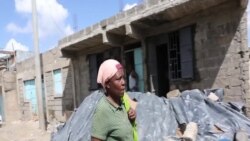Sixty-year-old Effa Kwendo lost two of her eight children in 2018, just months apart, when police — in broad daylight — shot them dead.
She admits her sons got into some trouble but, says nothing that would warrant the use of lethal force.
“Robert had never been arrested or taken to jail. No one ever called to tell me he had been arrested or taken someone’s car.” Kwendo said. ”All I know is that my son had a temper. If you wronged him, he would beat you up. Even my second son, there was nothing major he had done, maybe getting into little fights here and there.”
The deaths are just two of hundreds of cases of police killings that Kenyan rights groups have documented.
This month, a coalition of Kenyan rights groups reported police last year alone killed 107 people — most of them young, poor men shot to death in slums under suspicious circumstances.
“When we stop recognizing these deaths, these extrajudicial killings, when we say that nothing is changing and, therefore, we will not document it, we acquiesce to these killings.” said Renee Ngamau, Amnesty International.
Rights groups accuse Kenya’s Independent Policing Oversight Authority (IPOA) of not doing enough to stop the killings.
The IPOA says 142 cases from last year are under investigation but admits only six have been sent to the public prosecutor, who says few witnesses are willing to come forward.
“We are reaching out to a lot of these communities that have been affected by this problem and trying to sensitize them, trying to ask them to be more bold in terms of giving us the evidence.” said Noordin Haji, Director of Public Prosecution. “We are trying to make them understand their rights to access justice and how they can do that.”
Kenya this month for the first time allowed the informal visit of the UN's envoy on extrajudicial, summary or arbitrary executions Agnes Callamard, a French human rights expert.
She met relatives of police victims in Nairobi and Mombasa and called on Kenyan authorities to do more.
“When after these killings there is no investigation, there is no prosecution, and there is no justice — that’s the second killing.” Callamard said. “And that killing is a killing of our society. Impunity kills our society.”
Relatives of victims hope that the UN envoy’s visit will help stir the wheels of justice.
Meanwhile, Kenyan activists say they’ll keep documenting and publishing police killings until they no longer have to.






